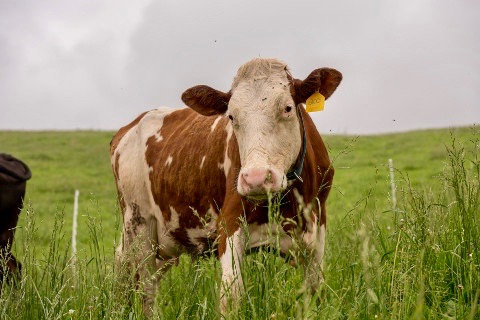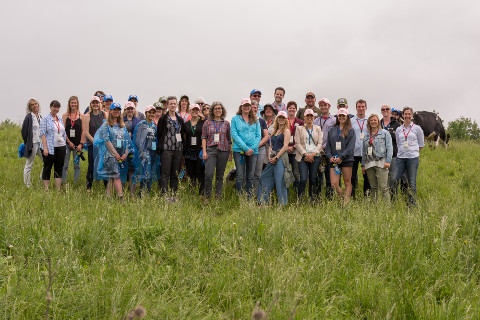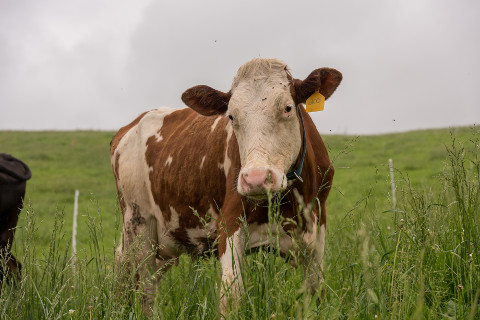
I’ve been a proponent of the organic movement for a long time. I made the switch to organic dairy and meat products before I got pregnant for the first time, 10 years ago. And I dedicated an entire chapter in my book, Feed the Belly: The Pregnant Mom’s Healthy Eating Guide, to the importance of choosing organic. My family and I have invested in filling our fridge with certified organic products ever since, and I’ve always felt great about making that choice. I had done the research and knew that it made sense to go organic with animal products from a health perspective, but it wasn’t until recently that I really understood what went into organic dairy farming.
Better for Animals and the Land
Early this summer I took a trip to Wisconsin to learn about organic dairy farming from the folks at Organic Valley. Something you may not know about me is that I was originally on track to go to vet school. I spent the first four years of my undergraduate education at Cornell as an Animal Science major in the Agriculture school. Being a vet was something I was passionate about since the age of five. So I loved visiting one of the family-owned farms that’s part of Organic Valley’s cooperative.
We visited Tucker and Becky Gretebeck’s farm (that’s one of their cows above) and saw how much work goes into their operation. To meet the USDA’s National Organic Program’s (NOP) standards, cows must be allowed to graze for at least 120 days each year. Feeding grass may seem simple, but the pasture that the cows are on needs to be rotated twice a day–each day–to protect the land, as well as the cows.
Dr. Guy Jodarski, the in-house veterinarian at Organic Valley, explained how if cows are allowed to graze all the way down to the base of the grass, they’re more likely to ingest worm larvae (gross!), and in an organic operation, no medications are allowed except for a list of complementary and alternative medicine treatments, set in place by the NOP. Back when I was studying animal science, this approach didn’t exist! I was fascinated to learn that you can treat cows with homeopathy, acupuncture, and botanical medicines, just like you can in humans.
On my visit to Wisconsin, I also learned about how the organic certification program works. Farmers have to keep track of every purchase they make for their farm and are audited by third party inspectors each year. You probably know that the organic seal on a food product means that no chemical pesticides or fertilizers were used on the land that a crop is grown on. For cows to produce organic milk, it means they cannot be given synthetic hormones or antibiotics, which are often used in conventional dairy farming to promote growth and ultimately end up in the milk our families drink. On an organic farm, antibiotics can be used to save an animal’s life, but then they must leave the herd and can’t be used in organic production anymore.

Better for You
Organic production also means that no GMOs (genetically modified organisms) are part of the final product. GMOS have led to “super weeds” on conventional farms, which require more and more toxic pesticides to kill. Know this—if you choose products that have the organic seal, they are also non-GMO. For me, this is just another great reason to choose organic. Need another? The grass that the cows eat doesn’t just provide nutrients for them, it also makes the milk much higher in healthy fats. How much higher? A recent study found that whole milk from organic, 100 percent grass-fed cows has 147 percent more omega-3 fatty acids than conventional whole milk. And organic grassmilk also has 125 percent more CLA (conjugated linoleic acid) than conventional milk. Omega-3s help keep our hearts healthy and are vital for a healthy pregnancy and a child’s developing brain and eyes. CLA has been shown to help promote a healthy weight and may be helpful in managing type 2 diabetes.
The small town I grew up in, Salamanca, NY, in the western part of the state, is surrounded by dairy farms. This proximity to farming is partially what inspired me to become a vet years ago. While my path may have evolved to the human side of health, I’m still passionate about animal health and welfare, as well as the sustainability of the land they live on. Every small choice we make each day, including what we eat, can add up to change that helps promote not only our health, but the health of the planet. I invite you to learn more about the organic standards, as well as organic farming. And send me any questions you have. We’re in this together!
Blog post content sponsored by Organic Valley

